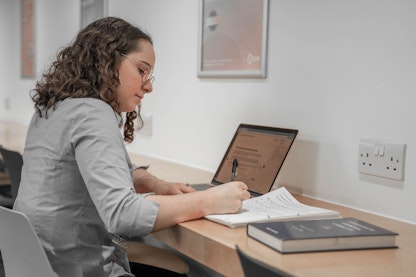Tax Inspector Job Profile

Find out what skills you need to become a tax inspector here.
Tax inspectors work within roles at Her Majesty’s Revenue & Customs (HMRC). The job is important to the functioning of the country, as it ensures that companies and individuals pay their tax correctly and on time. Tax payments from the people of the nation contribute to vital public services like schools, the NHS, and infrastructure, as well as helping families and individuals in need through the Universal Credit system.
Around 95% of tax in the UK is legally paid, and between the years of 2018 and 2019, HMRC secured just under £628 billion in tax. That’s due, in part, to the role that tax inspectors play. The HMRC has around 60,000 employees all over the country and they’re one of the most popular graduate employers.
If you’re thinking of becoming a tax inspector, whether that’s your dream role or a stepping stone in a larger career in tax or finance, read on to learn everything you need to know about the job role.
What is a tax inspector?
Tax inspectors are responsible for investigating tax evasion and may even represent HMRC at independent tribunals with the aim of receiving unpaid tax money. The role involves a certain degree of customer service, as tax inspectors are likely to work directly with individuals, accountants, and businesses on tax-related issues.
Responsibilities
The work of a tax inspector can be diverse and challenging, but the responsibilities of the role will gradually shift as you progress through the stages of your career.
Although they vary, the responsibilities of a tax inspector will usually include:
Being familiar and comfortable with tax legislation for companies, partnerships, organisations and individuals
Examining and researching accounts
Fraud investigation
Giving expert advice on tax
Negotiating tax settlements
Representing HMRC at tribunal
Inspecting finances of businesses
Reviewing business accounts in detail
Examining records
Visiting business premises for investigational purposes
Presenting a case in a written report and in-person
Tax inspector qualifications
The route to becoming a tax inspector requires the completion of the Tax Professional Graduate Programme (TPGP). This qualification, run by HMRC themselves, is the basis for a career in public sector taxation.
However, that’s not to say it’s the only qualification you should consider if you’re striving for a career as a tax inspector. In fact, to gain entry to the TPGP, you’ll need a 2:2 degree or the equivalent. There’s no specific course you need to take, but an undergraduate degree in the finance or tax area of study would be most beneficial. If you’re not a university student, you can gain equivalent knowledge and experience through other accountancy and tax qualifications.
Association of Taxation Technicians (ATT)
Achieving the ATT demonstrates an understanding of the basic UK tax system and will show your ability to provide tax advice and services. This qualification is an essential step towards Chartered Tax Advisor (CTA) status – you can study them consecutively or alongside each other.
Chartered Tax Advisor (CTA)
There are four levels of the Chartered Tax Advisor qualification. You must complete each CTA level, as well as have three years’ relevant and recent professional tax experience to qualify as a member of the Chartered Institute of Taxation (CIOT). It is also possible to study for the CTA through an apprenticeship, which will help you to gain the valuable on-the-job training that you need to progress.
Skills
Problem solving
A tax inspector might often be considered to be a bit of a detective – piecing parts of a puzzle together to understand the finances of a business under investigation. You’ll need excellent problem-solving skills for this.
People skills
As a tax inspector you should be comfortable with working with people from all walks of life. You’ll be required to liaise with solicitors, accountants, and business owners as well as individuals – and will have to converse about taxation in a way that’s accessible. Whatever the task, you’ll need to take a customer-focused approach.
Analysis
As a tax inspector, you’ll be able to fuse your knowledge of tax law with being able to crunch the numbers. Combining these two factors will make you excellent at analysis.
Reporting and investigation
Whether you’re investigating tax fraud or offering advice to new businesses, measuring and reporting will be a large part of your role as a tax inspector.
Dedication
The role of a tax inspector requires at least three years of dedicated training through the Tax Professional Graduate Programme, as well as any professional qualifications you have gained separately. Each course and qualification will require dedication and commitment to complete.
Teamworking
Teamworking is a vital aspect of the role, although tax inspectors should also follow their own initiative to complete tasks to deadline. An openness to change and flexibility will also be beneficial.
Salary and benefits
The starting salaries for recruits on the HMRC Tax Professional Graduate Programme are £30,260 or £34,400 with London weighting. Upon successful completion of the programme, at salary band 7, the starting salary is £50,010 nationally or £56,270 with London weighting.
The benefits of being a civil servant are generally seen very positively. Not only is the salary above average, the pension and maternity/paternity schemes are competitive too.
Career path
Work experience
As mentioned above, whilst studying for the CTA, candidates should undertake three years’ work experience. Gaining this through a tax-focused apprenticeship is a good way to progress. During your study on the TPGP, you will also undertake work placements within HMRC that include shadowing as well as mentoring and supervision. However, prior to this, work experience in taxation is not necessary to gain entry onto the Tax Professionals Graduate Programme.
Continuing professional development
The Tax Professionals Graduate Programme lasts three years and by the completion of the programme, graduates will be able to deal with complex tax cases, negotiate confidently and lead and influence teams.
The training is thorough, comprehensive, and has a modular structure to provide a broad insight into the range of work undertaken by HMRC. At the end of each three-month module, you will need to pass an exam.
Tax legislation is complex and changes frequently. As a result, tax professionals are expected to take part in continuing professional development, or CPD. This might take the form of training, taking part in conferences or reading around the subject. This is widely considered as being part of the job role, so a willingness to do this is fundamental to success.
Find out more about our accountancy programmes here.

